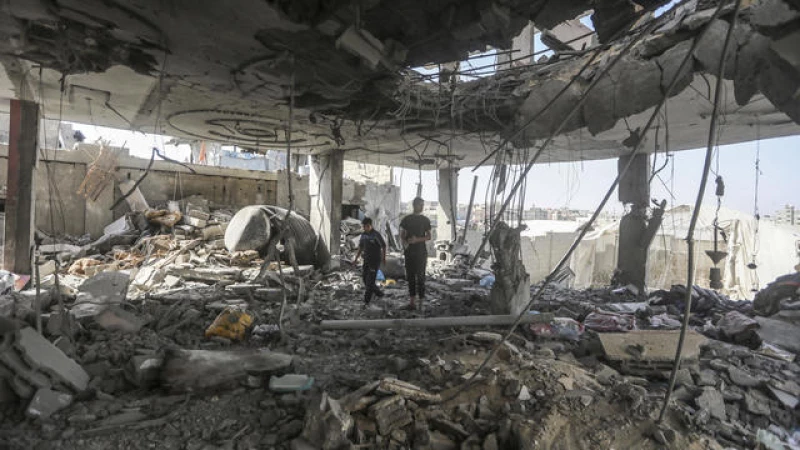Mounting pressure is driving efforts to secure a resolution — the humanitarian crisis in Gaza is rapidly worsening as Israel stands firm on its plan to launch an offensive into Rafah, the southernmost city in the territory.
The urgency to put an end to the nearly seven-month-long conflict is evident. Over 1 million Palestinians are seeking refuge in Rafah, situated along the border with Egypt, after fleeing northern Gaza, where a senior U.N. official warns of a severe famine.
Reports indicate that on Friday, CIA Director William Burns landed in Cairo, Egypt, to partake in the latest round of crucial negotiations concerning a potential hostage release and cease-fire agreement between Hamas and Israel. This development was confirmed by two U.S. officials and a source briefed on the situation.
The Latest Developments in the Israel-Hamas Conflict
Recent discussions between Israeli and U.S. officials have led to a new proposal from Israel, which American officials have praised as "generous."
Reports from Egyptian state Al-Qahera news suggest that progress has been made on several contentious issues, although details have not been disclosed. Hamas, on the other hand, is demanding a complete halt to the conflict and the removal of all Israeli troops from Gaza.
Secretary of State Antony Blinken recently made his seventh trip to Israel since the outbreak of violence initiated by Hamas militants on October 7. Upon his arrival, Blinken reiterated the Biden administration's commitment to brokering a cease-fire between Hamas and Israel. The conflict, according to health officials in Gaza, has resulted in the deaths of over 34,000 individuals, a majority of whom are women and children.
Israeli citizens, eager for U.S. assistance, gathered outside Blinken's hotel in Tel Aviv, expressing optimism that American intervention could help secure the release of the 133 hostages still believed to be held in Gaza, including five American nationals.
White House Urges Restraint in Israeli Military Operation in Rafah
The White House has urged Prime Minister Benjamin Netanyahu's government to limit the scale of its operation in Rafah. The head of the United Nations has also renewed his warning, stating that a military offensive in the city would lead to "an unbearable escalation, killing thousands more civilians and forcing hundreds of thousands to flee."
Conflict Background
The conflict began on Oct. 7, when Hamas attacked southern Israel, resulting in the abduction of about 250 people and the death of around 1,200 individuals, mostly civilians.
Israeli Stance
Despite ongoing negotiations, a senior Israeli official, speaking anonymously, downplayed the chances of a full end to the war. Israel remains committed to the Rafah invasion and has stated that it will not agree to end the war as part of a deal to release hostages.
Recent Developments
A recent strike in the Nuseirat refugee camp in central Gaza resulted in the death of three individuals, according to hospital officials. In the last 24 hours, local hospitals in Gaza have received the bodies of 32 people killed by Israeli strikes. The Gaza Health Ministry reported that women and children make up around two-thirds of the casualties, without distinguishing between fighters and civilians.
Israeli Military Claims
The Israeli military claims to have killed 13,000 militants but has not provided evidence to support this assertion. Additionally, mass arrests have been conducted during Israeli raids inside Gaza.
Gaza's Health Ministry also on Saturday urged the International Criminal Court to investigate the death in Israeli custody of a Gaza surgeon. Adnan al-Borsh, 50, was working at al-Awda Hospital when Israeli troops stormed it, detaining him and others inside in December, according to the Palestinian Prisoner's Club.
In related developments this week, Israel briefed Biden administration officials on plans to evacuate civilians ahead of the Rafah operation, according to U.S. officials familiar with the talks.
The United Nations has warned that hundreds of thousands would be "at imminent risk of death" if Israel moves forward into the densely packed city, which is also a critical entry point for humanitarian aid.
The U.S. director of the U.N. World Food Program, Cindy McCain, said Friday that trapped civilians in the north, the most cut-off part of Gaza, have plunged into famine. McCain said a cease-fire and a greatly increased flow of aid through land and sea routes was essential.
Israel recently opened new crossings for aid into northern Gaza, but on Wednesday, Israeli settlers blocked the first convoy before it crossed into the besieged enclave. Once inside Gaza, the convoy was commandeered by Hamas militants, before U.N. officials reclaimed it.
The proposal that Egyptian mediators had put to Hamas sets out a three-stage process that would bring an immediate, six-week cease-fire and partial release of Israeli hostages, and would include some sort of Israeli pullout. The initial stage would last for 40 days.
Hamas has announced a plan to release female civilian hostages in exchange for Palestinian prisoners held by Israel.
Gershon Baskin, director for the Middle East at the International Communities Organization, revealed that Hamas has agreed to the framework proposed by Egypt, which Israel has already accepted.
Baskin mentioned that negotiators are currently working on the specifics of the exchange. He also stated that if Israel dispatches its top negotiators to Cairo after the Sabbath ends on Saturday evening, it would indicate a high level of seriousness from Israel's side.
___







